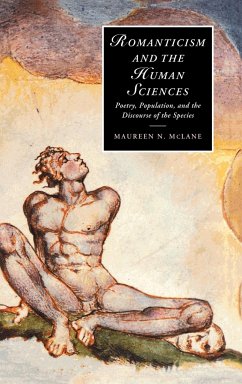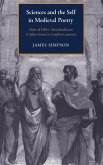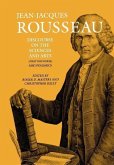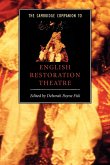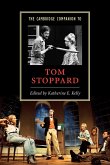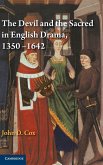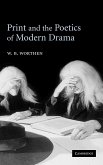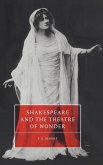Maureen N. McLane
Romanticism and the Human Sciences
Poetry, Population, and the Discourse of the Species
Maureen N. McLane
Romanticism and the Human Sciences
Poetry, Population, and the Discourse of the Species
- Gebundenes Buch
- Merkliste
- Auf die Merkliste
- Bewerten Bewerten
- Teilen
- Produkt teilen
- Produkterinnerung
- Produkterinnerung
This book, first published in 2000, examines Romantic poetry in relation to the philosophical, political and anthropological discourse of the period.
Andere Kunden interessierten sich auch für
![Sciences and the Self in Medieval Poetry Sciences and the Self in Medieval Poetry]() J. SimpsonSciences and the Self in Medieval Poetry97,99 €
J. SimpsonSciences and the Self in Medieval Poetry97,99 €![Discourse on the Sciences and Arts (First Discourse) and Polemics Discourse on the Sciences and Arts (First Discourse) and Polemics]() Jean-Jacques RousseauDiscourse on the Sciences and Arts (First Discourse) and Polemics78,99 €
Jean-Jacques RousseauDiscourse on the Sciences and Arts (First Discourse) and Polemics78,99 €![The Cambridge Companion to English Restoration Theatre The Cambridge Companion to English Restoration Theatre]() Deborah Payne FiskThe Cambridge Companion to English Restoration Theatre47,99 €
Deborah Payne FiskThe Cambridge Companion to English Restoration Theatre47,99 €![The Cambridge Companion to Tom Stoppard The Cambridge Companion to Tom Stoppard]() E. Kelly (ed.)The Cambridge Companion to Tom Stoppard52,99 €
E. Kelly (ed.)The Cambridge Companion to Tom Stoppard52,99 €![The Devil and the Sacred in English Drama, 1350-1642 The Devil and the Sacred in English Drama, 1350-1642]() John D. CoxThe Devil and the Sacred in English Drama, 1350-1642107,99 €
John D. CoxThe Devil and the Sacred in English Drama, 1350-1642107,99 €![Print and the Poetics of Modern Drama Print and the Poetics of Modern Drama]() W. B. WorthenPrint and the Poetics of Modern Drama106,99 €
W. B. WorthenPrint and the Poetics of Modern Drama106,99 €![Shakespeare and the Theatre of Wonder Shakespeare and the Theatre of Wonder]() T. G. BishopShakespeare and the Theatre of Wonder96,99 €
T. G. BishopShakespeare and the Theatre of Wonder96,99 €-
-
-
This book, first published in 2000, examines Romantic poetry in relation to the philosophical, political and anthropological discourse of the period.
Hinweis: Dieser Artikel kann nur an eine deutsche Lieferadresse ausgeliefert werden.
Hinweis: Dieser Artikel kann nur an eine deutsche Lieferadresse ausgeliefert werden.
Produktdetails
- Produktdetails
- Verlag: Cambridge University Press
- Seitenzahl: 296
- Erscheinungstermin: 15. Mai 2012
- Englisch
- Abmessung: 235mm x 157mm x 22mm
- Gewicht: 634g
- ISBN-13: 9780521773485
- ISBN-10: 0521773482
- Artikelnr.: 26084404
- Herstellerkennzeichnung
- Produktsicherheitsverantwortliche/r
- Europaallee 1
- 36244 Bad Hersfeld
- gpsr@libri.de
- Verlag: Cambridge University Press
- Seitenzahl: 296
- Erscheinungstermin: 15. Mai 2012
- Englisch
- Abmessung: 235mm x 157mm x 22mm
- Gewicht: 634g
- ISBN-13: 9780521773485
- ISBN-10: 0521773482
- Artikelnr.: 26084404
- Herstellerkennzeichnung
- Produktsicherheitsverantwortliche/r
- Europaallee 1
- 36244 Bad Hersfeld
- gpsr@libri.de
Maureen N. McLane was educated at the Universities of Harvard, Oxford, and Chicago. She is the author of Same Life: Poems (Farrar, Straus and Giroux, 2008) and Balladeering, Minstrelsy, and the Making of British Romantic Poetry (Cambridge University Press, 2008). She is also co-editor of The Cambridge Companion to British Romantic Poetry (Cambridge University Press, 2008). A contributing editor at the Boston Review, she was for years the chief poetry critic of the Chicago Tribune, and her articles on poetry, contemporary fiction, teaching, and sexuality have appeared in many venues, including The New York Times, The Washington Post, American Poet, the Poetry Foundation website, The Boston Globe, The Boston Phoenix, the Chicago Review, and the Harvard Review. In 2003 she won the National Book Critics Circle's Nona Balakian Award for Excellence in Book Reviewing, and in 2007 she was elected to a three-year term on the Board of Directors of the NBCC. She has taught at Harvard University, the University of Chicago, MIT, and the East Harlem Poetry Project, and is currently an Associate Professor in the English Department at NYU. Her poems have appeared or are forthcoming in jubilat, American Poet, The New Yorker, Slate, Canary, Circumference, A Public Space, American Letters and Commentary, The American Scholar, New American Writing, the Harvard Review, and Jacket. Her interests include contemporary poetry, British romanticism, balladry, historiography, psychoanalysis, anthropology, American studies and Scottish studies.
Acknowledgements
Introduction, or the thing at hand
1. Toward an anthropologic: poetry, literature, and the discourse of the species
2. Do rustics think? Wordworth, Coleridge, and the problem of a 'human diction'
3. Literate species: populations, 'humanities', and the specific failure of literature in Frankenstein
4. The 'arithmetic of futurity': poetry, population, and the structure of the future
5. Dead poets and other romantic populations: immortality and its discontents
Epilogue, or Immortality interminable: the use of poetry for life
Notes
Bibliography
Index.
Introduction, or the thing at hand
1. Toward an anthropologic: poetry, literature, and the discourse of the species
2. Do rustics think? Wordworth, Coleridge, and the problem of a 'human diction'
3. Literate species: populations, 'humanities', and the specific failure of literature in Frankenstein
4. The 'arithmetic of futurity': poetry, population, and the structure of the future
5. Dead poets and other romantic populations: immortality and its discontents
Epilogue, or Immortality interminable: the use of poetry for life
Notes
Bibliography
Index.
Acknowledgements
Introduction, or the thing at hand
1. Toward an anthropologic: poetry, literature, and the discourse of the species
2. Do rustics think? Wordworth, Coleridge, and the problem of a 'human diction'
3. Literate species: populations, 'humanities', and the specific failure of literature in Frankenstein
4. The 'arithmetic of futurity': poetry, population, and the structure of the future
5. Dead poets and other romantic populations: immortality and its discontents
Epilogue, or Immortality interminable: the use of poetry for life
Notes
Bibliography
Index.
Introduction, or the thing at hand
1. Toward an anthropologic: poetry, literature, and the discourse of the species
2. Do rustics think? Wordworth, Coleridge, and the problem of a 'human diction'
3. Literate species: populations, 'humanities', and the specific failure of literature in Frankenstein
4. The 'arithmetic of futurity': poetry, population, and the structure of the future
5. Dead poets and other romantic populations: immortality and its discontents
Epilogue, or Immortality interminable: the use of poetry for life
Notes
Bibliography
Index.

